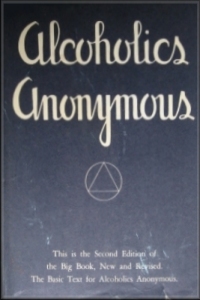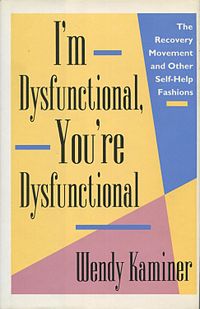
Alcoholics Anonymous (AA) is a global peer-led mutual aid fellowship begun in the United States dedicated to abstinence-based recovery from alcoholism through its spiritually inclined twelve-step program. AA's twelve traditions, besides stressing anonymity, establish it as free to all, non-professional, unaffiliated, and non-denominational as well as apolitical with a public relations policy of attraction rather than promotion. In 2020 AA estimated a worldwide membership of over two million, with 75% of those in the US and Canada.
Twelve-step programs are international mutual aid programs supporting recovery from substance addictions, behavioral addictions and compulsions. Developed in the 1930s, the first twelve-step program, Alcoholics Anonymous (AA), founded by Bill Wilson and Bob Smith, aided its membership to overcome alcoholism. Since that time dozens of other organizations have been derived from AA's approach to address problems as varied as drug addiction, compulsive gambling, sex, and overeating. All twelve-step programs utilize a version of AA's suggested twelve steps first published in the 1939 book Alcoholics Anonymous: The Story of How More Than One Hundred Men Have Recovered from Alcoholism.
Anti-psychiatry, sometimes spelled antipsychiatry, is a movement based on the view that psychiatric treatment is often more damaging than helpful to patients, highlighting controversies about psychiatry. Objections include the reliability of psychiatric diagnosis, the questionable effectiveness and harm associated with psychiatric medications, the failure of psychiatry to demonstrate any disease treatment mechanism for psychiatric medication effects, and legal concerns about equal human rights and civil freedom being nullified by the presence of diagnosis. Historical critiques of psychiatry came to light after focus on the extreme harms associated with electroconvulsive therapy or insulin shock therapy. The term "anti-psychiatry" is in dispute and often used to dismiss all critics of psychiatry, many of whom agree that a specialized role of helper for people in emotional distress may at times be appropriate, and allow for individual choice around treatment decisions.

Self-help or self-improvement is a self-directed improvement of oneself—economically, physically, intellectually, or emotionally—often with a substantial psychological basis.

The Myth of Mental Illness: Foundations of a Theory of Personal Conduct is a 1961 book by the psychiatrist Thomas Szasz, in which the author criticizes psychiatry and argues against the concept of mental illness. It received much publicity, and has become a classic, well known as an argument that "mentally ill" is a label which psychiatrists have used against people "disabled by living" rather than truly having a disease.

In psychology, codependency is a theory that attempts to explain imbalanced relationships where one person enables another person's self-destructive behavior such as addiction, poor mental health, immaturity, irresponsibility, or under-achievement.
Richard Bentall is a Professor of Clinical Psychology at the University of Sheffield in the UK.

I'm OK – You're OK is a 1967 self-help book by psychiatrist Thomas Anthony Harris. It is a practical guide to transactional analysis as a method for solving problems in life.

"Surely You're Joking, Mr. Feynman!": Adventures of a Curious Character is an edited collection of reminiscences by the Nobel Prize–winning physicist Richard Feynman. The book, released in 1985, covers a variety of instances in Feynman's life. The anecdotes in the book are based on recorded audio conversations that Feynman had with his close friend and drumming partner Ralph Leighton.
In some schools of popular psychology and analytical psychology, the inner child is an individual's childlike aspect. It includes what a person learned as a child before puberty. The inner child is often conceived as a semi-independent subpersonality subordinate to the waking conscious mind. The term has therapeutic applications in counseling and health settings. The concept became known to a broader audience through books by John Bradshaw and others.
John Elliot Bradshaw was an American educator, counselor, motivational speaker, and author who hosted a number of PBS television programs on topics such as addiction, recovery, codependency, and spirituality. Bradshaw was active in the self-help movement, and was credited with popularizing such ideas as the "wounded inner child" and the dysfunctional family. In promotional materials, interviews, and reviews of his work, he was often referred to as a theologian.
Melody Beattie is an American author of self-help books on codependent relationships.
Stanton Peele is a psychologist, attorney, psychotherapist and the author of books and articles on the subject of alcoholism, addiction and addiction treatment.
Wendy Kaminer is an American lawyer and writer. She has written several books on contemporary social issues, including A Fearful Freedom: Women's Flight From Equality, about the conflict between egalitarian and protectionist feminism; I'm Dysfunctional, You're Dysfunctional: The Recovery Movement and Other Self-Help Fashions, about the self-help movement; and Sleeping with Extra-Terrestrials: The Rise of Irrationalism and Perils of Piety.
A toxic leader is a person who abuses the leader–follower relationship by leaving the group or organization in a worse condition than it was in. Toxic leaders therefore create an environment that may be detrimental to employees, thus lowering overall morale in the organization.
Covert incest, also known as emotional incest, is a type of abuse in which a parent looks to their child for the emotional support that would be normally provided by another adult. The effects of covert incest on children when they become adults are thought to mimic actual incest, although to a lesser degree. This term describes interactions between a parent and child that are exclusive of sexual abuse.
Self-help groups for mental health are voluntary associations of people who share a common desire to overcome mental illness or otherwise increase their level of cognitive or emotional wellbeing. Despite the different approaches, many of the psychosocial processes in the groups are the same. Self-help groups have had varying relationships with mental health professionals. Due to the nature of these groups, self-help groups can help defray the costs of mental health treatment and implementation into the existing mental health system could help provide treatment to a greater number of the mentally ill population.
The Spann-Fischer Codependency Scale is a 16-item self-report instrument that has been proposed as a measure of co-dependency. The scale is based upon a definition of codependency as "a dysfunctional pattern of relating to others with an extreme focus outside of oneself, lack of expression of feelings, and personal meaning derived from relationships with others." Codependency has no established definition within the mental health community, and is not a recognized diagnosis as a mental health disorder.
Personal boundaries or the act of setting boundaries is a life skill that has been popularized by self help authors and support groups since the mid-1980s. Personal boundaries are established by changing one's own response to interpersonal situations, rather than expecting other people to change their behaviors to comply with your boundary. For example, if the boundary is to not interact with a particular person, then one sets a boundary by deciding not to see or engage with that person, and one enforces the boundary by politely declining invitations to events that include that person and by politely leaving the room if that person arrives unexpectedly. The boundary is thus respected without requiring the assistance or cooperation of any other people. Setting a boundary is different from issuing an ultimatum; an ultimatum is a demand that other people change their choices so that their behavior aligns with the boundary-setter's own preferences and personal values.

Alcoholics Anonymous: The Story of How More Than One Hundred Men Have Recovered from Alcoholism is a 1939 basic text, describing how to seek recovery from alcoholism. The Big Book was written by William G. "Bill W." Wilson, one of the founders of Alcoholics Anonymous, with the help of various editors. The composition process was not collaborative other than editing. Bill wrote all of the chapters except for "To Employers" which was written by Bill's right hand man, Hank Parkhurst. Parkhurst influenced the more liberal notions of "God as we understand him" and "your own conception of God." Drafts of sections were sent back and forth between Bill W.'s group in New York and Robert Holbrook Smith, the other AA founder, in Akron, Ohio. Dr. Bob made no major changes. It is the predecessor of the seminal "twelve-step method" widely used to treat many addictions, from alcoholism, heroin addiction and marijuana addiction to overeating, sex addiction and gambling addiction, with a strong spiritual and social emphasis. It is one of the best-selling books of all time, having sold 30 million copies. In 2011, Time magazine placed the book on its list of the 100 best and most influential books written in English since 1923, the year in which the magazine was first published. In 2012, the Library of Congress designated it as one of 88 "Books that Shaped America."






